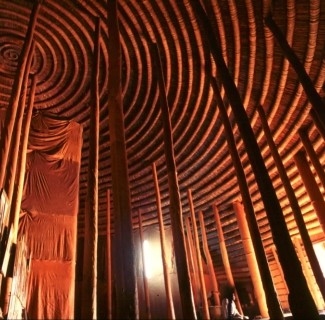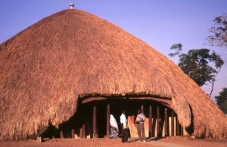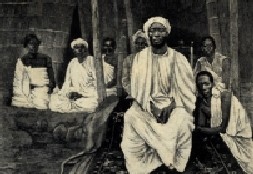|
Uganda Culture - Arts | Society Uganda's Unesco-listed royal tombs lost to fire
Citizens in Kampala this night witnessed a large fire at the historic hill site of Kasubi close to the capital. Most of the royal tombs of the old Buganda kingdom were impossible to save and were lost to the fire. At least four of the main tombs housing earlier Buganda kabakas (kings) were totally damaged.
The President also told the crowd that authorities would consider possibilities for a reconstruction. "Government will see how it can assist in undoing the damage caused," President Museveni said. The current Kabaka of Buganda, Ronald Muwenda Mutebi II, today also visted the site. Ugandan media report the Kabaka was seen to be too saddened to make the expected speech to the large crowd. The king's spokesman Medard Sseggona however told journalists that the court would "set up independent investigations as a kingdom." In most of Uganda's post-independence history, the kabakas have experienced strong conflicts with the political leaders of Uganda. Also the current Kabaka is a thorn in the eye of President Museveni's attempt to control national politics. The Baganda, citizens of the Buganda kingdom, remain the largest population group in modern Uganda, and political leaders fear the potential political influence the Kabaka could develop. The conflict between
The royal tombs stand as a key monument for the Baganda, their proud history and their religious beliefs. The kabakas still actively and frequently use the Kasubi site to perform religious and other rites, gathering large groups. These rites have often been seen as a challenge to the political leaders of Uganda. The fascinating architecture, palace design and history of the royal tombs have also made them the major tourist attraction in the Kampala region. The Unesco-listed site on the Kasubi hilltop includes the former palace of the Buganda kabakas, built in 1882 and converted into the royal burial ground in 1884. The UN's cultural agency describes the tombs as "a major example of an architectural achievement in organic materials, principally wood, thatch, reed, wattle and daub," reflecting "technical achievements developed over many centuries" in the Buganda kingdom. By staff writers © afrol News - Create an e-mail alert for Uganda news - Create an e-mail alert for Culture - Arts news - Create an e-mail alert for Society news
On the Afrol News front page now
|
front page
| news
| countries
| archive
| currencies
| news alerts login
| about afrol News
| contact
| advertise
| español
©
afrol News.
Reproducing or buying afrol News' articles.
You can contact us at mail@afrol.com










